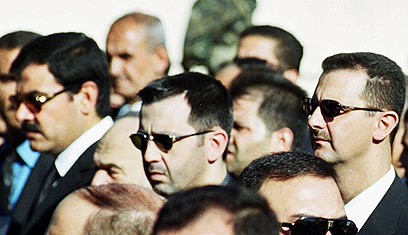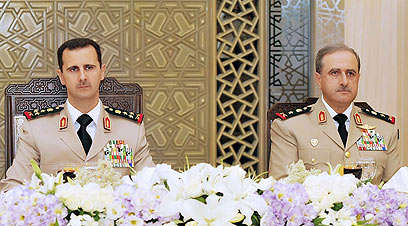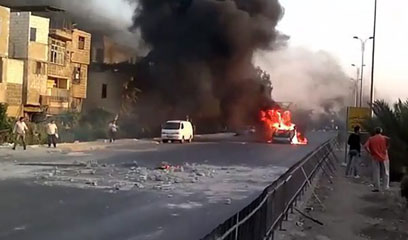
Syrian rebels: Bashar will be next
Damascus terror attack that killed top Syrian officials strikes at heart of Bashar Assad's ruling elite, sparking hope among rebels
Rebels claimed responsibility for the attack, saying they had been planning it for two months.
Related stories:
- Top Syrian officials killed in blast
- Celebrations, defections follow Damascus blast
- Nasrallah: Our missiles are Syrian
"God willing, this is the beginning of the end of the regime," said Riad al-Asaad, a commander of the disparate rebel forces who operate across the country. Al-Asaad, who is not related to the president, spoke to The Associated Press by telephone from Turkey, where he is based.
"Hopefully Bashar will be next," Al-Asaad said in a chilling warning to the 46-year-old Syrian president, a tall, lanky leader who once felt so confident in his security that he was known to hate being surrounded by bodyguards.

Bashar and Maher Assad and Shawkat (Photo: AP)
Patrick Seale, biographer of Assad's father, Hafez Assad, said: "Assad is a front man for a big security establishment of 300,000 regular army. He has a small clique that supplies him with information.
"They might still mount a coup against him and that remains his big threat."
As fighting rages in Damascus, and the Assad family that has ruled Syria for four decades struggles for its life against a growing rebellion, a picture is emerging of a tight inner group determined to fight its way out of the crisis, even as support for the government falls away.
At its head is President Assad, who inherited power from his father in 2000 and who friends and opponents alike say appears increasingly detached from reality, convinced he is fighting a conspiracy against him and Syria.
Around Assad is a tight circle of family and clan members, and a security establishment staffed mainly by adherents of the Alawite minority to which the Assads belong, a branch of Shiite Islam in a country that is three quarters Sunni.

Assad and Rajih (Photo: EPA)
“Even those who love him feel he can no longer provide security,” said Ayman Abdel-Nour, an adviser to Assad until 2007 and now an opposition figure. “They think he is useless and living in a cocoon.”
“He thinks of himself as God’s messenger to rule Syria. He listens to the sycophants around him who tell him ‘you are a gift from God’. He believes that he is right and that whoever contradicts him is a traitor. Many of his close friends and advisers have either left him or distanced themselves from him.”
In response, Assad has taken charge of a military crisis unit and takes all the daily decisions, from the deployment of army units to tasks assigned to the security services, as well as mobilization of the Alawite Shabbiha, the feared militia accused of a series of massacres in the past two months.
“Bashar remains the center. He is involved in the day-to-day details of managing the crisis,” said a Lebanese politician close to the Syrian rulers. “He set up an elite unit led by him to manage the crisis daily.”
In this unit, intelligence chief Hisham Bekhtyar is responsible for security coordination, Dawoud Rajha is minister of defense, Assef Shawkat, the president’s powerful brother-in-law, is deputy chief of staff of the armed forces. Alongside them are Ali Mamlouk, special adviser on security, Abdel-Fattah Qudsiyeh, head of military intelligence, and Mohammad Nassif Kheyrbek, a veteran operator from the era of Assad’s father.
Maher al-Assad, the president’s younger brother and Syria’s second most powerful man, commands the main loyalist strike forces.
“Maher is directly involved in the confrontation on the ground and is in direct contact with every one of them. He has direct military responsibilities,” the Lebanese politician said.

Fierce battels in capital (Photo: EPA)
"Bashar and his regime have been profoundly destabilized but there is some doubt whether he can be toppled by the rebels for all the following reasons: Russia's protection, a divided opposition and no appetite for military intervention," said Assad biographer Patrick Seale.
But he added: "No regime can last forever ... I cannot see a peaceful settlement for the moment. I can see a bloody stalemate, more shooting, more killing. The situation is very bad, chaos and insecurity are everywhere. Kidnapping, killing and hostage-taking, ethnic-cleansing are rife," Seale said.
He said Assad's officer corps would not give up on him unless they feel they will have a role in a post-Assad Syria.
US: Assad losing control of Syria
The focus of the United Sates, Qatar and Saudi Arabia is to try and entice senior officials and officers to split from the Assad circle to weaken his hold on power.
"At some point, they will feel that there is no way out and they have to abandon the boat before it sinks," said a Western diplomat.
The White House said the bombing showed Assad was "losing control" of Syria
"We, the United States, are closely monitoring Syria's proliferation-sensitive materials and facilities, and we believe that Syria's chemical weapons stockpile remains under Syrian government control," White House press secretary Jay Carney told reporters.
AP and Reuters contributed to this report
- Receive Ynetnews updates directly to your desktop










